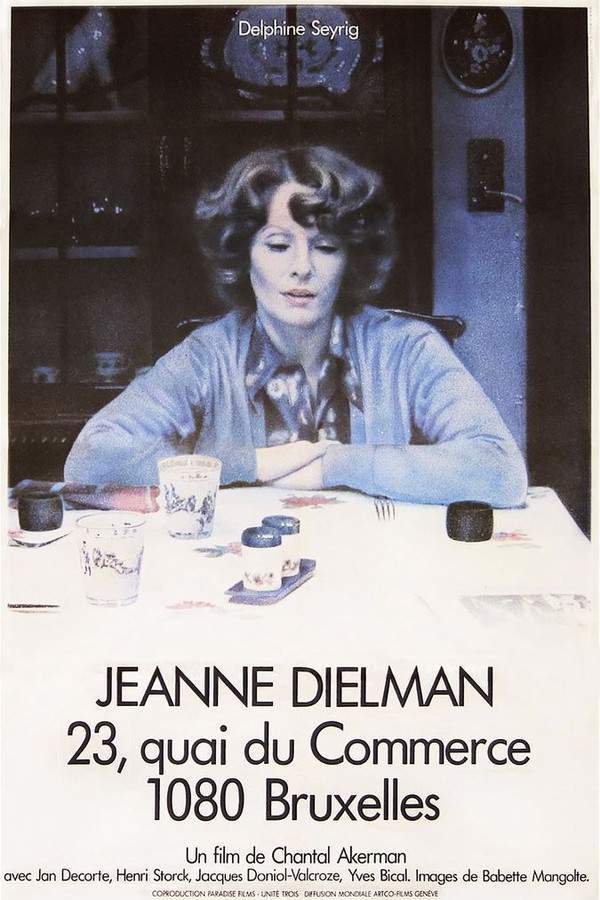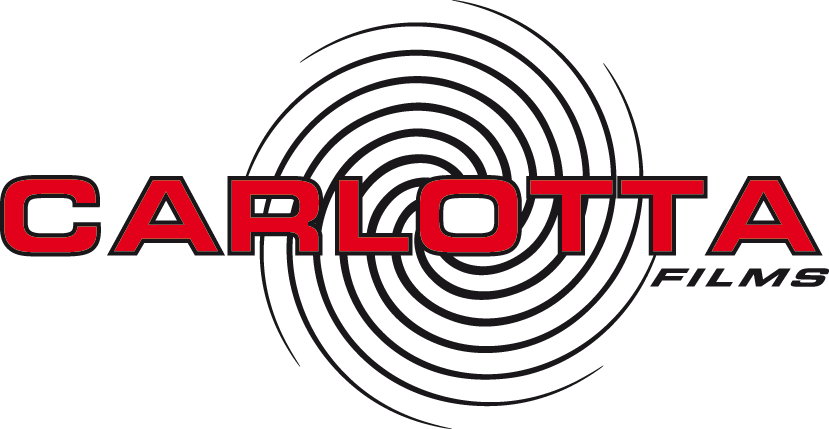
Jeanne Dielman, 23, quai du commerce, 1080 Bruxelles 1978
Made by

Carlotta Films
Test your knowledge of Jeanne Dielman, 23, quai du commerce, 1080 Bruxelles with our quiz!
Jeanne Dielman, 23, quai du commerce, 1080 Bruxelles Plot Summary
Read the complete plot summary and ending explained for Jeanne Dielman, 23, quai du commerce, 1080 Bruxelles (1978). From turning points to emotional moments, uncover what really happened and why it matters.
The film intricately explores the life of a widowed mother whose meticulously structured days revolve around cooking, cleaning, and mothering, while also managing her daily errands over a span of three days. The character, Jeanne Dielman, whose name is revealed solely in the title and a letter she reads to her son, supplements her income by engaging in sexual encounters with a different client each afternoon, just before her son returns from school. For Jeanne, this prostitution is woven into her monotonous routine, carried out with an almost mechanical precision.
However, after a visit from a client on the second day, Jeanne’s meticulously organized life begins to show signs of disarray. She overcooks potatoes during dinner preparation, meanders throughout her apartment with the pot, and forgets crucial tasks such as placing the lid on the urn where she keeps her earnings. Her forgetfulness extends to leaving lights on in various rooms, missing a button on her house coat, and even dropping a recently washed spoon. These gradual deviations from her established routine escalate on the third day when her client arrives.
During the encounter, a complex mix of emotions brews within Jeanne; she grapples with either experiencing an orgasm or feeling a profound disgust for her actions. Following the encounter, she dresses and instead of providing comfort to her client, she shocksingly turns violent, using scissors to stab him to death. After committing this act, she quietly retreats to her dining room table, where she sits in eerie stillness, leaving the audience to ponder the profound implications of her life and choices.
Jeanne Dielman, 23, quai du commerce, 1080 Bruxelles Timeline
Follow the complete movie timeline of Jeanne Dielman, 23, quai du commerce, 1080 Bruxelles (1978) with every major event in chronological order. Great for understanding complex plots and story progression.
Introduction to Jeanne's Life
The film opens by introducing Jeanne Dielman, a widowed mother whose life is steeped in routine. Her days consist of repetitive tasks such as cooking, cleaning, and caring for her son, encapsulating the struggle of a single parent juggling responsibilities.
Daily Errands and Routine
For three consecutive days, Jeanne meticulously carries out her daily errands, ensuring that her home is organized and her son is well cared for. This structure represents her attempt to maintain control in her life amidst the chaos of widowhood.
Engaging in Prostitution
To supplement her income, Jeanne engages in sexual encounters with a different client each afternoon. She accomplishes this just before her son returns from school, blending her work into the seams of her otherwise monotonous day.
The First Day Encounter
The first day progresses without incident, maintaining the facade of Jeanne's routine. However, this normalcy is punctuated by the underlying tension of her secret life, which she shields from her son.
Signs of Disarray Begin to Emerge
On the second day, after an encounter with a client, surprising changes occur in Jeanne's behavior. She starts to exhibit signs of forgetfulness, such as overcooking dinner and failing to complete basic tasks, hinting at her internal turmoil.
Increased Forgetfulness
As the day progresses, Jeanne's forgetfulness escalates in alarming ways. She forgets to put lids on jars, leaves lights on, and even neglects her appearance, showing a slip from her previously pristine self.
Climactic Third Day
The third day marks a pivotal point for Jeanne, as she prepares for her client with an anxious energy. The routine she clings to begins to unravel dramatically, reflecting her growing instability.
Conflict of Emotions During Encounter
During the encounter with her final client, Jeanne grapples with conflicting emotions of pleasure and disgust. This internal struggle culminates in a moment of violent realization as she confronts her feelings towards her life choices.
The Act of Violence
In an unexpected turn of events, Jeanne brandishes scissors and violently stabs her client. This shocking act not only signifies a breaking point for her but also serves as a stark commentary on the depths of her despair.
Silent Reflection
After committing the murder, Jeanne retreats to her dining room table in silence. Her stillness prompts a haunting reflection on her decisions, leaving both her and the audience in a state of contemplation about the nature of her existence.
Life After the Incident
In the aftermath of the violent encounter, Jeanne’s life is irrevocably changed. The stark contrast between her previous routine and her new reality showcases the complexity of her character and her circumstances.
Questioning Choices
The film concludes with an open-ended question about Jeanne's choices and the life she had constructed. It challenges the audience to reflect on the implications of her actions and the societal structures surrounding her.
Jeanne Dielman, 23, quai du commerce, 1080 Bruxelles Characters
Explore all characters from Jeanne Dielman, 23, quai du commerce, 1080 Bruxelles (1978). Get detailed profiles with their roles, arcs, and key relationships explained.
Jeanne Dielman
Jeanne Dielman is a widowed mother whose life revolves around her meticulous daily routines of cooking, cleaning, and caring for her son. As she secretly engages in prostitution, her character embodies the struggles of isolation and the roles women are expected to perform. Her descent into chaos culminates in an act of violence, reflecting her emotional turmoil and the desperate need for control in her life.
Jeanne Dielman, 23, quai du commerce, 1080 Bruxelles Settings
Learn where and when Jeanne Dielman, 23, quai du commerce, 1080 Bruxelles (1978) takes place. Explore the film’s settings, era, and how they shape the narrative.
Time period
The movie is set in a contemporary time frame, likely during the 1970s when social norms surrounding gender roles and sexuality were evolving. This era is crucial in understanding the societal expectations placed on women, as Jeanne's struggles reflect broader themes of female autonomy and domestic confinement.
Location
Brussels, Belgium
The film takes place in Brussels, specifically in a modest apartment where Jeanne Dielman carries out her daily activities. Known for its unique architecture and vibrant culture, Brussels serves as the backdrop for Jeanne's mundane yet complex life, reflecting the juxtaposition between the city's bustling nature and her solitary confinement.
Jeanne Dielman, 23, quai du commerce, 1080 Bruxelles Themes
Discover the main themes in Jeanne Dielman, 23, quai du commerce, 1080 Bruxelles (1978). Analyze the deeper meanings, emotional layers, and social commentary behind the film.
🌀
Isolation
Isolation permeates Jeanne's life, marked by her repetitive routines and limited social interactions. The film intricately depicts her emotional detachment, highlighting the profound loneliness that stems from her dual life as a mother and a sex worker. This theme culminates in her shocking violent outburst, symbolizing a breaking point in her isolated existence.
⚖️
Violence
The theme of violence is subtly woven into Jeanne's everyday life until it culminates in a shocking act. The film portrays the violence not only as a physical act but also as a metaphor for the emotional and psychological turmoil Jeanne experiences. This theme raises questions about the nature of power and agency in her life.
🍽️
Domesticity
Domesticity is central to Jeanne’s identity, as she derives her sense of purpose from household tasks. The film portrays this aspect with an almost documentary-like attention to detail, emphasizing how her role as a homemaker contrasts with her secret life, ultimately depicting the complexities of a woman's existence within domestic spaces.

Coming soon on iOS and Android
The Plot Explained Mobile App
From blockbusters to hidden gems — dive into movie stories anytime, anywhere. Save your favorites, discover plots faster, and never miss a twist again.
Sign up to be the first to know when we launch. Your email stays private — always.
Jeanne Dielman, 23, quai du commerce, 1080 Bruxelles Spoiler-Free Summary
Discover the spoiler-free summary of Jeanne Dielman, 23, quai du commerce, 1080 Bruxelles (1978). Get a concise overview without any spoilers.
In 1970s Brussels a modest apartment becomes the stage for a quietly powerful portrait of everyday existence. The film follows Jeanne Dielman, a widowed mother whose life is defined by the precise cadence of cooking, cleaning, and caring for her young son. By day she moves through a meticulously ordered routine of household chores and errands, and by afternoon she steps into a discreet, transactional intimacy that sustains the family’s modest means. The city outside remains a muted backdrop to the interior world she carefully curates, where the ticking of a clock and the hum of a stove are as integral to the story as any dialogue.
The atmosphere is deliberately unhurried, allowing the viewer to feel the weight of each repeated gesture. The camera lingers on the slow, almost choreographic motions of folding laundry, setting a table, or arranging the modest décor of her home. This visual patience creates a sense of both reverence and restraint, inviting the audience to consider how routine can become a sanctuary as well as a cage. The tonal palette is austere, the lighting soft but stark, underscoring a mood that oscillates between calm domesticity and an undercurrent of latent tension.
As the days progress, subtle variations begin to ripple through Jeanne’s otherwise steadfast schedule. The film hints that even the most disciplined patterns are vulnerable to small cracks, and that the quiet pressure of maintaining such a balance can stir feelings that are difficult to name. Through its minimalist style and focus on the minutiae of daily life, the story invites contemplation of how personal identity, responsibility, and desire intersect when the ordinary becomes the sole stage for survival.
Can’t find your movie? Request a summary here.
Featured on this page

What's After the Movie?
Not sure whether to stay after the credits? Find out!
Explore Our Movie Platform
New Movie Releases (2026)
Famous Movie Actors
Top Film Production Studios
Movie Plot Summaries & Endings
Major Movie Awards & Winners
Best Concert Films & Music Documentaries
Movie Collections and Curated Lists
© 2026 What's After the Movie. All rights reserved.





